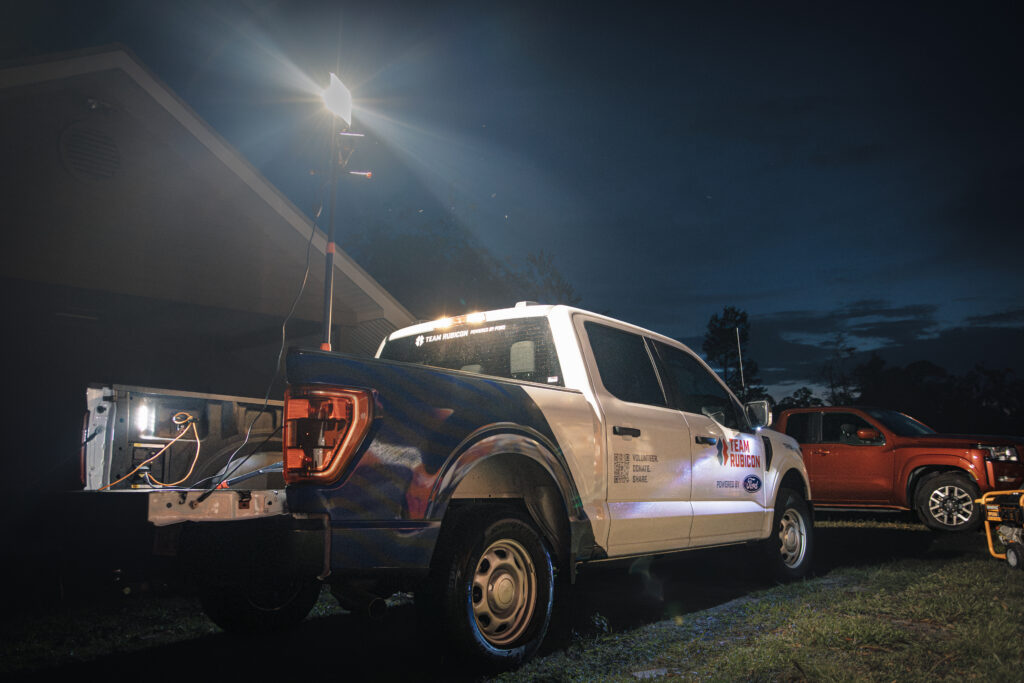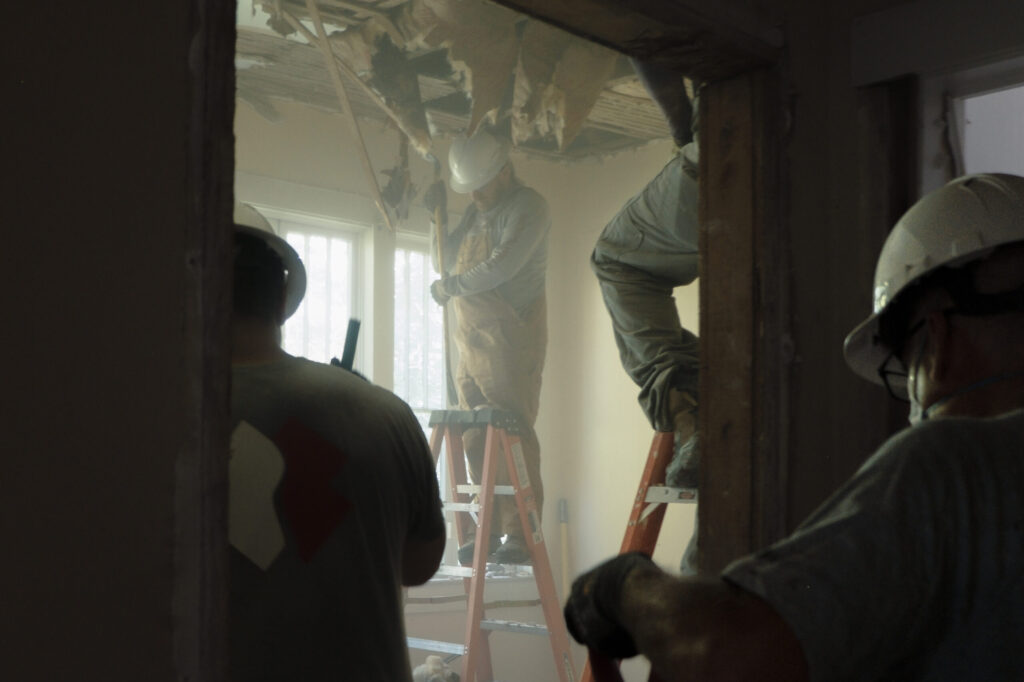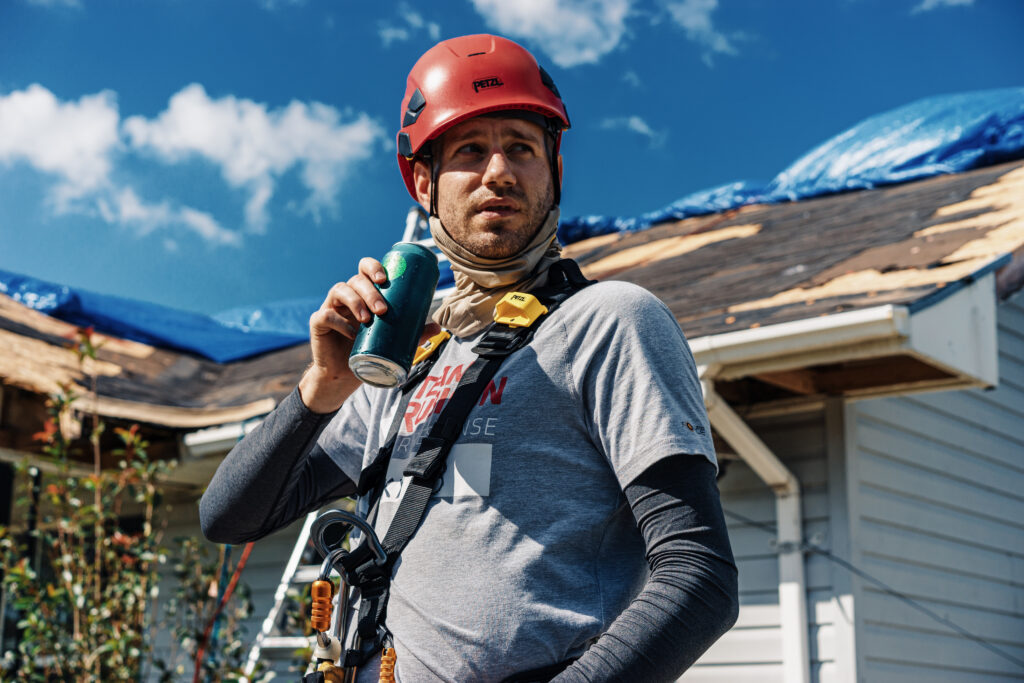Team Rubicon serves communities before, during, and after disasters and crises. It may seem strange, but before is when communities facing potential disasters find the biggest returns; you save more lives and preserve more homes by preparing for a disaster than you do responding to one. These are the three Rs of addressing disasters: response, recovery, and resilience. And while the most visible work is responding to disasters and helping communities recover from them, the most important work is done on resilience. Those three Rs of disaster relief go hand in hand with the three Rs of better waste management and environmentalism, too: reduce, reuse, and recycle.
Volunteers work just as hard preparing communities to be resilient against disaster as they do responding to disasters, except that building resilience brings longer term benefits to the community. Research suggests that every dollar a community invests on disaster preparedness can save them up to $11 in response or recovery costs. Preventing damage from occurring in the first place is far more effective than repairing the damage after it occurs.
Although we tend to hear about recycling the most often, out of the three Rs, it is the least environmentally friendly. The energy requirements alone, let alone the myriad transportation and sorting processes involved, make recycling the worst option. “The best way to manage waste,” according to NASA, “is to not produce it in the first place.”
Reduce Emissions and Gasoline for Better Disaster Response
In 2023, The Ford Motor Company donated a new fleet to Team Rubicon, including 3 all-electric F-150 Lightning and 10 F-150 Power Boost hybrid trucks with Pro Power Onboard, to help volunteers reduce our dependency on gas and lower the emissions that our operations produce.
“The Pro Power feature makes us nimbler,” says Team Rubicon’s Senior Director of Strategic Partnerships Matt Colvin, “because we can now charge tools and power our bases without gasoline generators and the pollution, and noise pollution, they create.” Additionally, not having to carry generators and gasoline for them allows volunteers to carry more equipment, be more efficient, and serve more people.

Another step in using the reduce, reuse, recycle framework is to build homes more resilient to disasters. Not only is it good for those who live in disaster-prone areas, it can help reduce post-disaster debris, which is also good for the communities.
According to FEMA, for example, the 2018 Camp Fire in California generated more than 3.6 million tons of debris. In Florida, Hurricane Ian is estimated to have left behind nearly 31 million cubic yards of disaster debris, according to the Florida Division of Emergency Management. And tornado debris has been carried and dropped more than 100 miles away.
The Long Term Recovery program at Team Rubicon straddles the recovery and resilience spaces by rebuilding or repairing damaged and destroyed homes with the next storm in mind. Using resilient building materials and techniques whenever possible offers homeowners the reassurance of higher levels of disaster readiness.
The Long Term Recovery teams also use durable products, like storm-resistant shingles and impact protected windows, and forward-looking methods, such as rebuilding with a continuous load path, to make houses sturdier and better able to withstand future disasters. Reducing risk by adding resilience also means spending fewer resources in the future when the next storm inevitably hits. Fewer homes needing repairs after a storm means less energy used and fewer environmental impacts before, during, and after the disaster.
Another reduction technique is mitigation. At the intersection of response and resilience, Team Rubicon’s mitigation work includes removing potential fire fuel from around a community, creating fire breaks within a community, and controlling erosion and drainage problems. Team Rubicon conducted 28 wildfire or flood mitigation operations across the country in 2023, building resilience and reducing the risk for thousands of Americans.
Reuse Leads to Cleaner Recovery in the Field
To that end, Team Rubicon has begun reducing the single-use plastics used in operations, incorporating field recycling procedures where possible, and encouraging volunteers to carry refillable water bottles and coffee mugs on operations and events. Plastic bottles need as much water as they hold just to be produced so, in addition to slowing our use of disposable plastics, this strategy saves money and water too, another net gain for the environment.

Discouraging single-use plastics on operations and projects has been easier with the introduction of several Team Rubicon branded cups, mugs, tumblers, and bottles, seen frequently in the field. Partners like Hertz also make it easier for volunteers to reduce their waste by donating reusable water bottles. “It’s important for volunteers to stay hydrated in the field,” explained Greyshirt volunteer leader Bob Bledsoe, “but it’s also important to limit our impact on the communities we serve and that includes the amount of waste we generate.”
Recycle Before for Best Results After
Once a disaster has passed, if a community can recycle debris it can take weight off typically overwhelmed landfills. This is why Team Rubicon operations and events, wherever possible, incorporate recycling into standard mobilization and de-mobilization procedures. We work with communities to keep them clean, TR clean, as the saying goes.

Communities with recycling programs in place may also be eligible for further reimbursement by state or federal authorities after disaster. Scarce or otherwise valuable resources can also be reused more effectively with a preexisting recycling service, which also leads to less waste and environmental impact while saving the community time and money to replace. Recycling can be a valuable tool in managing waste and resources, promoting community resilience, and even bolstering local economies as well as a sustainable tactic in recovering from disaster.
Team Rubicon seeks to support humanity and build resiliency for vulnerable communities across the globe, working through all phases of the disaster cycle to do so. We have a bias for action but on Earth Day we should remember that sometimes the best thing to do is less. Pollute less, use less plastic and other disposable items, throw less in the trash: reduce our way to resilience.
Get 15% off this Earth Day
Use code EARTHDAY for 15% off tumblers, mugs, and everything else in the Team Rubicon store now through Friday, April 26.



